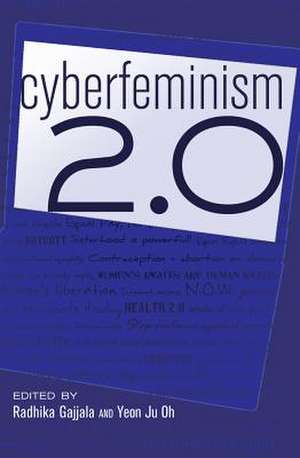Cyberfeminism 2.0: Digital Formations, cartea 74
Editat de Radhika Gajjala, Yeon Ju Ohen Limba Engleză Paperback – 7 feb 2012
| Toate formatele și edițiile | Preț | Express |
|---|---|---|
| Paperback (1) | 387.86 lei 6-8 săpt. | |
| Peter Lang Gmbh, Internationaler Verlag Der W – 7 feb 2012 | 387.86 lei 6-8 săpt. | |
| Hardback (1) | 1016.86 lei 6-8 săpt. | |
| Peter Lang Gmbh, Internationaler Verlag Der W – 20 feb 2012 | 1016.86 lei 6-8 săpt. |
Din seria Digital Formations
- 20%
 Preț: 352.99 lei
Preț: 352.99 lei - 20%
 Preț: 1255.38 lei
Preț: 1255.38 lei - 20%
 Preț: 422.67 lei
Preț: 422.67 lei - 20%
 Preț: 377.42 lei
Preț: 377.42 lei - 27%
 Preț: 949.37 lei
Preț: 949.37 lei - 9%
 Preț: 747.01 lei
Preț: 747.01 lei -
 Preț: 329.15 lei
Preț: 329.15 lei - 27%
 Preț: 934.61 lei
Preț: 934.61 lei - 9%
 Preț: 682.03 lei
Preț: 682.03 lei - 27%
 Preț: 883.69 lei
Preț: 883.69 lei - 20%
 Preț: 377.24 lei
Preț: 377.24 lei - 23%
 Preț: 458.12 lei
Preț: 458.12 lei -
 Preț: 499.24 lei
Preț: 499.24 lei -
 Preț: 248.37 lei
Preț: 248.37 lei - 9%
 Preț: 783.41 lei
Preț: 783.41 lei - 20%
 Preț: 351.86 lei
Preț: 351.86 lei - 20%
 Preț: 430.92 lei
Preț: 430.92 lei - 23%
 Preț: 705.46 lei
Preț: 705.46 lei -
 Preț: 240.88 lei
Preț: 240.88 lei - 23%
 Preț: 907.55 lei
Preț: 907.55 lei - 20%
 Preț: 754.73 lei
Preț: 754.73 lei - 20%
 Preț: 320.29 lei
Preț: 320.29 lei - 20%
 Preț: 429.43 lei
Preț: 429.43 lei - 9%
 Preț: 735.29 lei
Preț: 735.29 lei - 27%
 Preț: 1140.65 lei
Preț: 1140.65 lei - 20%
 Preț: 430.09 lei
Preț: 430.09 lei - 8%
 Preț: 559.49 lei
Preț: 559.49 lei - 27%
 Preț: 894.94 lei
Preț: 894.94 lei - 20%
 Preț: 338.61 lei
Preț: 338.61 lei - 9%
 Preț: 789.51 lei
Preț: 789.51 lei - 23%
 Preț: 788.53 lei
Preț: 788.53 lei -
 Preț: 364.56 lei
Preț: 364.56 lei - 23%
 Preț: 924.04 lei
Preț: 924.04 lei - 27%
 Preț: 949.10 lei
Preț: 949.10 lei -
 Preț: 430.67 lei
Preț: 430.67 lei - 27%
 Preț: 1064.99 lei
Preț: 1064.99 lei - 27%
 Preț: 1064.54 lei
Preț: 1064.54 lei
Preț: 387.86 lei
Nou
Puncte Express: 582
Preț estimativ în valută:
74.23€ • 76.58$ • 62.82£
74.23€ • 76.58$ • 62.82£
Carte tipărită la comandă
Livrare economică 04-18 martie
Preluare comenzi: 021 569.72.76
Specificații
ISBN-13: 9781433113581
ISBN-10: 1433113589
Pagini: 314
Dimensiuni: 225 x 152 x 20 mm
Greutate: 0.44 kg
Ediția:Nouă
Editura: Peter Lang Gmbh, Internationaler Verlag Der W
Seriile Digital Formations, Digital Formations (Paperback)
ISBN-10: 1433113589
Pagini: 314
Dimensiuni: 225 x 152 x 20 mm
Greutate: 0.44 kg
Ediția:Nouă
Editura: Peter Lang Gmbh, Internationaler Verlag Der W
Seriile Digital Formations, Digital Formations (Paperback)
Notă biografică
Radhika Gajjala is Professor of Media and Communication at Bowling Green State University. She is author of Cyberselves: Feminist Ethnographies of South Asian Women (2004) and Weavings of the Real and Virtual: Cyberculture and the Subaltern (forthcoming). She is co-editor of South Asian Technospaces (2008), Webbing Cyberfeminist Practice (2008), and Global Media Culture and Identity (2011).Yeon Ju Oh is a PhD candidate in the School of Media and Communication at Bowling Green State University. Her research interests encompass women in technology, the relationship between gender and new media technologies, gender/racial/ethnic identities in online space, and feminist knowledge production.
Cuprins
Contents: Radhika Gajjala/Yeon Ju Oh: Cyberfeminism 2.0: Where Have All the Cyberfeminists Gone? - Marina Levina: Our Data, Ourselves: Feminist Narratives of Empowerment in Health 2.0 Discourse - Jessie Daniels: BlogHer and Blogalicious: Gender, Race, and the Political Economy of Women's Blogging Conferences - Lauren Angelone: A Critical Discourse Analysis of Representations of Female Doctoral Student Bloggers and Implications for Education - Rosalind Sibielski: Beyond Democratization and Subversion: Rethinking Feminist Analytical Approaches to Girls' Cultural Production on the Internet - Holly Kruse: Fandom, Technology, and Practice - and the Relevance of Cyberfeminism - Debbie James: What It Takes to Screen Her Film: A Feminist Study of UNESCO's Audiovisual E-Platform Submission Process - Erica Kubik: Masters of Technology: Defining and Theorizing the Hardcore/Casual Dichotomy in Video Game Culture - Jessica L. Beyer: Women's (Dis)embodied Engagement with Male-Dominated Online Communities - Genesis Downey: Guilding, Gaming, and Girls - Jennifer Way: Back to the Future: Women Art Technology - Dara Persis Murray: Structuring EDNOS as Cyberpostfeminist Rule - Becky Walker: Debating Intimate Partner Violence in Lesbian Fan Communities - Yeon Ju Oh: Is Your Space Safe? Cyberfeminist Movement for Space Online at Unnine - Natalia Rybas: Where Is My Profile Picture? Multiple Politics of Technological Mothering and Gendered Technology - Koen Leurs: Migrant Youth Invading Digital Spaces: Intersectional Performativity of Self in Socio-Technological Networks.




























